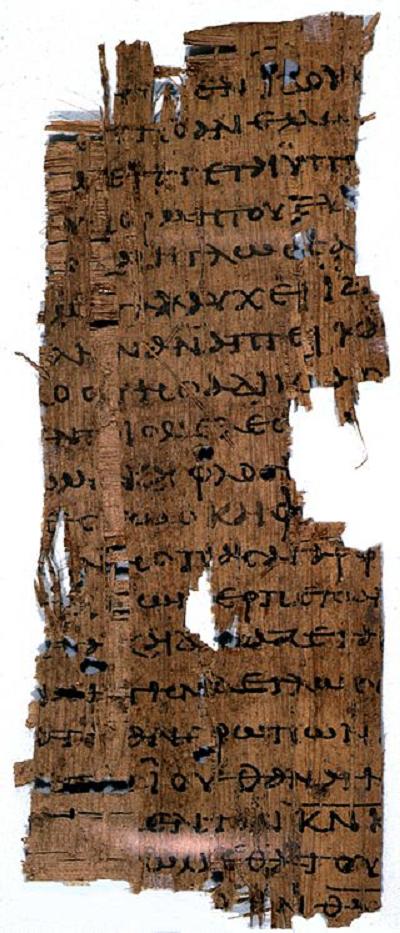| Change to Book/Chapter View |
|
|
|
Translation process is ongoing. For current status see details |
|
|

Papyrus 20 Discovered: Oxyrhynchus, Egypt Location: Princeton, N.J.: Princeton University Libraries Contents: James 2:19 – 3:9
James 2 19 You believe that God is one. You do well. The demons also believe, and shudder. 20 But do you want to know, vain man, that faith apart from works is dead? 21 Wasn’t Abraham our father justified by works, in that he offered up Isaac his son on the altar? 22 You see that faith worked with his works, and by works faith was perfected. 23 So the Scripture was fulfilled which says, “Abraham believed God, and it was accounted to him as righteousness,” and he was called the friend of God. 24 You see then that by works, a man is justified, and not only by faith. 25 In the same way, wasn’t Rahab the prostitute also justified by works, in that she received the messengers and sent them out another way? 26 For as the body apart from the spirit is dead, even so faith apart from works is dead.
James 3 Let not many of you be teachers, my brothers, knowing that we will receive
heavier judgment. 2 For we all
stumble in many things. Anyone who
doesn’t stumble in word is a perfect person, able to bridle the whole body
also. 3 Indeed, we put bits into the horses’ mouths so
that they may obey us, and we guide their
whole body. 4 Behold, the ships also, though they are so big and are driven by
fierce winds, are yet guided by a
very small rudder, wherever the pilot desires.
5 So the tongue is also a little member, and
boasts great things. See how a
small fire can spread to a large forest!
6 And the tongue is a
fire. The world of iniquity among our members is the
tongue, which defiles the whole body,
and sets on fire the course of nature,
and is set on fire by Gehenna. 7 For
every kind of animal, bird, creeping thing, and sea creature, is tamed, and has been
tamed by mankind; 8 but
nobody can tame the tongue. It is a restless evil, full of
deadly poison. 9 With it we
bless |
How to read these pages: • The
translation to the left is based on the World English Bible. Words in regular
black font are words in the manuscript matching the Majority Text for that
passage. • Words
in italics cannot be seen in the manuscript, since the manuscript is
fragmentary. These words are supplied for readability by the World English
Bible translation. • Words
present in the manuscript but with some letters unreadable or missing are in blue
like this: blue. One Greek word often is
translated into multiple English words, and when this occurs, all the English
words are in blue. • Words
present in the manuscript but with spelling or trivial word order differences that do not affect the
meaning are in green like this: green. • If
the manuscript is different from the Majority Text, words in the Majority
Text that are missing from the text of the manuscript are marked through in red
like this: • If the manuscript is different from the Majority Text, words in the manuscript that are not in the Majority Text are underlined in red like this: new words.If the manuscript differs from the Majority Text yet matches another well-known text, this is noted in the footnotes.
|
